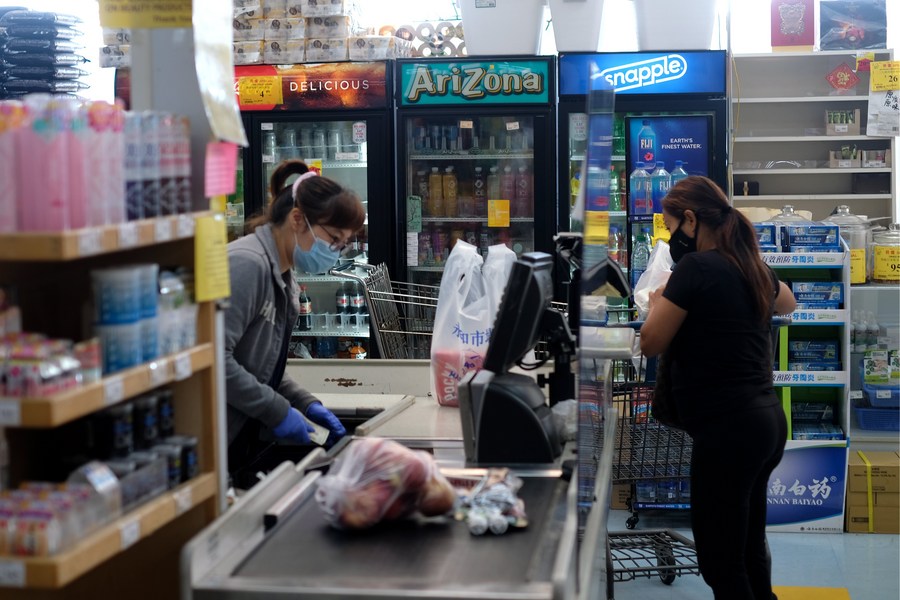U.S. Fed inches closer to tapering asset purchases amid inflation, Delta variant concerns

U.S. Federal Reserve Chairman Jerome Powell testifies at a hearing before the House Select Subcommittee on the Coronavirus Crisis on the Federal Reserve's Response to the Coronavirus Pandemic in Washington, D.C., the United States, on June 22, 2021. (Graeme Jennings/Pool via Xinhua)
The Fed hasn't made the decision regarding the timeline of tapering its asset purchases, but Fed officials expect the economy to continue moving toward the standard of "substantial further progress", Chair Jerome Powell said.
WASHINGTON, July 28 (Xinhua) -- The U.S. Federal Reserve on Wednesday signaled that the central bank is inching closer to tapering its asset purchases amid concerns over surging inflation and the rapid spread of the Delta variant of COVID-19.
The U.S. economy "has made progress" toward the Fed's goals of maximum employment and price stability since last December, the Fed said in a statement after concluding a two-day meeting, adding the central bank will continue to assess progress in coming meetings.
While indicators of U.S. economic activity and employment "have continued to strengthen," the sectors most adversely affected by the pandemic "have not fully recovered," the Fed said, noting the path of the economy continues to depend on the course of the virus.
While COVID-19 cases are on the rise across the country in recent weeks, Fed Chair Jerome Powell seems not very concerned about the economic effects from the spread of the Delta variant.
"What we've seen is with successive waves of COVID over the past year and some months now, there has tended to be less economic implications from each wave," Powell said Wednesday afternoon at a virtual press conference.
"It seems like we've learned to handle this. I think people would like to get back to, you know, the way things were, I hope, to some extent, we will over time," he said.
Powell said the Fed hasn't made the decision regarding the timeline of tapering its asset purchases, but Fed officials expect the economy to continue moving toward the standard of "substantial further progress".

People dine at a restaurant in Washington, D.C., the United States, July 13, 2021. (Xinhua/Liu Jie)
"We have not reached substantial further progress yet, so we're not there. We see ourselves as having some ground to cover to get there," Powell said, adding he would want to see strong job numbers in the coming months.
The Fed has pledged to keep its benchmark interest rate unchanged at the record-low level of near zero, while continuing its asset purchase program at least at the current pace of 120 billion U.S. dollars per month until "substantial further progress" has been made on employment and inflation.
While the Fed is not in any hurry to taper, the Fed's latest statement suggests that the time of tapering is "drawing nearer", said Jay Bryson, chief economist at Wells Fargo Securities.
"We look for Fed officials to begin dropping hints in the next month or two about an eventual tapering of asset purchases," Bryson said Wednesday in a note, expecting the Fed to make a formal announcement in December, with the actual process of winding down the purchases to begin early next year.
Powell also said at the press conference that U.S. inflation will "remain elevated" in the coming months before moderating to normal levels due to supply bottlenecks.
"As the economy continues to open, we're seeing upward pressure on prices, particularly because supply bottlenecks in some sectors have limited how quickly production can respond," he said, adding inflation could turn out to be "higher and more persistent" than the Fed expected.
"If we saw signs that longer term inflation expectations were moving materially and persistently beyond levels consistent with our goal, we'd be prepared to adjust the stance of policy," he said.

A woman shops at a supermarket in San Mateo, California, the United States, July 21, 2021. (Xinhua/Wu Xiaoling)
Diane Swonk, chief economist at Grant Thornton, a major accounting firm, said the Fed will not worry as long as most consumers and businesses expect inflation to remain in the Fed's long-term target range of about 2 percent.
"If those longer term expectations were to markedly shift, the Fed would be forced to move more aggressively, to taper rapidly and then raise rates," Swonk said.
U.S. consumer prices in June rose 0.9 percent from the previous month and 5.4 percent from a year earlier, the largest 12-month increase in roughly 13 years, according to the Labor Department.
While Powell remains defiantly upbeat about the U.S. economic outlook, that optimism has not changed the trajectory for rate hikes, Swonk said.
"The Fed will wait until we see a few more good months of employment gains before tapering asset purchases and even longer before raising rates," she said.
Joseph Brusuelas, chief economist at accounting and consulting firm RSM US LLP, also expected the Fed to announce tapering in December and begin withdrawing accommodation from financial markets early next year.
"We anticipate that this will take the better part of next year, and that implies that any prospective increase in the federal funds policy rate will not begin until late next year or in the first half of 2023 at the earliest," Brusuelas said.
Photos
Related Stories
- Delta variant, misinformation, politicization fuel COVID-19 surge in U.S.
- U.S. failed in COVID-19 response by almost every metric
- Delta variant identified in Nanjing's COVID-19 clusters
- Delta variant spreading in Europe, but unlikely to rival earlier pandemic waves
- New COVID-19 cases, deaths and spread of variants all on the rise: WHO
Copyright © 2021 People's Daily Online. All Rights Reserved.










